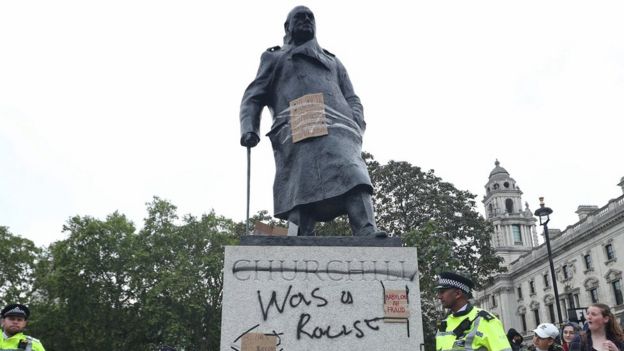As an adult, I was always at a loss understanding how people born in India could not be angry. Did they not care that the Bastard Empire ruined everything? Even the loss of a historical continuity, and the very fact that here I am thinking and blogging in English? Why such a worship of the barbarians who decimated life all around the world? (Not that the rest of the world, including the old country, was a paradise otherwise.)
Over the years, I have blogged in plenty ranting about the Bastard Empire, and even celebrating the mess when the Conservatives tumble. I am mighty glad that it has once again become a small island that is irrelevant to the rest of the world, as it was for most of human history.
So, of course, I read with delight the tweets about the statue of a slave trader being toppled and dumped in the water. It is beyond my wildest imagination how that bastard could have branded the enslaved. Branded? Seriously, branded?
Between 1672 and 1689, Colston’s Royal African Company shipped about 100,000 enslaved people from West Africa to the Americas and the Caribbean, branding them on their chests with his corporation’s acronym, RAC. Disease and dehydration killed more than 20,000 people taken onto those ships by Colston’s company, and their bodies were thrown into the ocean. Yet Colston’s bronze statue, which was erected in 1895 in Bristol, was engraved with the inscription “ … one of the most virtuous and wise sons” of the city.
What a bastard! Honorable men they are!
Even more celebrated is the cigar-chomping bastard who was one godawful racist.
The history that we were taught in middle and high school didn't present such unvarnished truths. Instead, the UK-educated Anglophiles presented the bastards as heroes!
The following is an unedited re-post from October 28, 2010:
***************************************************
Soutik Biswas writes in reviewing Madhusree Mukherjee's Churchill's Secret WarSome three million Indians died in the famine of 1943. The majority of the deaths were in Bengal. In a shocking new book, Churchill's Secret War, journalist Madhusree Mukherjee blames Mr Churchill's policies for being largely responsible for one of the worst famines in India's history.Why is the war time prime minister, Churchill, to be blamed? Well, the acute shortage of food
was caused by large-scale exports of food from India for use in the war theatres and consumption in Britain - India exported more than 70,000 tonnes of rice between January and July 1943, even as the famine set in. This would have kept nearly 400,000 people alive for a full year. Mr Churchill turned down fervent pleas to export food to India citing a shortage of ships - this when shiploads of Australian wheat, for example, would pass by India to be stored for future consumption in Europe. As imports dropped, prices shot up and hoarders made a killing. Mr Churchill also pushed a scorched earth policy - which went by the sinister name of Denial Policy - in coastal Bengal where the colonisers feared the Japanese would land. So authorities removed boats (the lifeline of the region) and the police destroyed and seized rice stocks.And, what was Churchill's response when this was discussed at cabinet meetings? The soon to be appointed Viceroy, Archibald Wavell, writes:
"Apparently it is more important to save the Greeks and liberated countries than the Indians and there is reluctance either to provide shipping or to reduce stocks in this country," writes Sir Wavell in his account of the meetings. Mr Amery is more direct. "Winston may be right in saying that the starvation of anyhow under-fed Bengalis is less serious than sturdy Greeks, but he makes no sufficient allowance for the sense of Empire responsibility in this country," he writes.As Shakespeare wrote, "And Brutus is an honourable man" .... :(

No comments:
Post a Comment